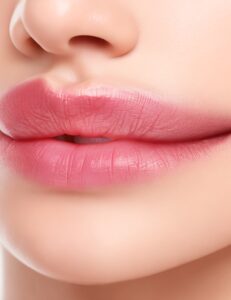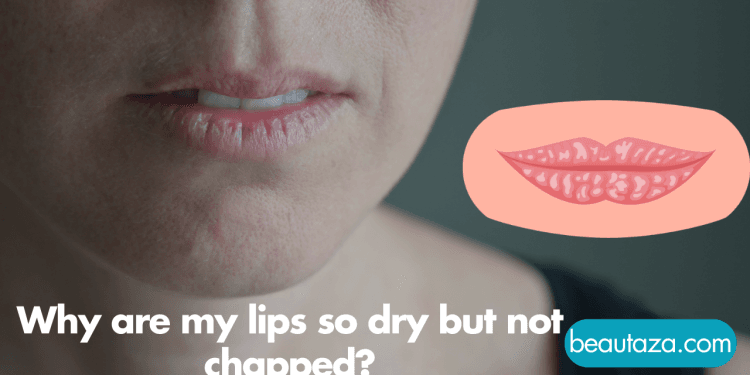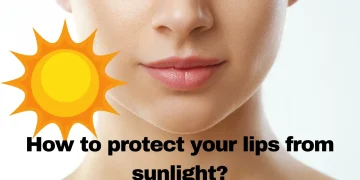
Dry skin and chapped lips are common complaints throughout the winter months.
Even if our lips don’t split or seem chapped, they feel parched and painful. Our skin loses its natural protective oils when exposed to chilly temperatures.
Have you ever wondered, “Why do my lips feel dry even though they aren’t chapped?” I’ll review the most common causes of dry lips and provide tips for keeping your pout soft and supple.
How Do Chapped Lips Feel And Appear?
Chapped lips are common and annoying. Dry, flaky, cracked lips are likely.
Rough lips may develop white patches or lines. Lips feel tight, harsh, unpleasant, and sensitive when rubbed or stretched.
Your lips will be dry since the location is dry. Dehydration may cause burning, itching, and dry mouth.
Chapped lips may cause significant edema around the mouth.
Instead of licking them, apply a lip balm containing shea butter or beeswax to seal in moisture and soothe the region.
What Brings About Chapped Lips?
Dry skin produces chapped lips. Environmental factors cause most chapped lips.
This includes air conditioning, wind, sun, and cold.
High temperatures cause the body to draw moisture from the lips to avoid dryness.
They may feel dry, cracking, and unpleasant. Saliva evaporates fast, causing chapped lips.
Avoid lip balms containing taste enhancers or allergies and over-licking, especially for delicate skin.
Dehydration, allergies, vitamin and mineral shortages, smoking, alcohol, hormonal changes, and some medications may cause chapped lips.
Because their skin is less resilient, people with diabetes or eczema may have more severe chapped lips.
Protecting, hydrating, and nourishing lips prevents chapping.
In lip balm, zinc oxide, and other mineral-based UV blockers protect fragile lip skin.
Consuming adequate drinks may prevent dehydration. A balanced diet rich in vitamins A, E, and B and minerals like zinc and iron will help maintain healthy skin, particularly lips.
What Signs Point to Chapped Lips?
You probably have chapped lips if you notice that the skin on your lips is consistently dry. Lips that are chapped may be highly uncomfortable and irritable. Drink lots of water throughout the day to stay hydrated and prevent developing dry, chapped lips.
Apply a hydrating lip balm or ointment multiple times daily to keep your lips from drying out and relieve inflammation.
If your lips are already chapped, you may need to use a second medicated treatment with substances like menthol or camphor, which can soothe the region where you apply them while also assisting in the healing of damaged skin.
Avoid licking your lips too often since saliva rapidly evaporates, worsening the skin’s already-present dryness.
Visit a doctor for more guidance if these solutions do not relieve after one or two days. You may need more rigorous therapies.
Examples include medically recommended lotions, ointments, and lip balms with excellent hydrating ingredients like petroleum jelly and hyaluronic acid, which retain moisture in the skin’s layers and significantly reduce dryness.
What Is the Cause of Dry, But Not Chapped, Lips?
Even without chapping, my lips feel dry and unhealthy. This may be unpleasant.
Dry weather might produce this on your lips. Winter air is dry, causing dry skin and painful lips.
Dehydration may worsen this condition. Your lips need a complete lip treatment to heal.
Start with high-quality lip balm. Vitamin E-containing lip balms may protect against UV radiation and other environmental hazards. Vitamin deficiencies may cause chapped lips.
To stay hydrated and healthy, consume electrolyte-containing beverages and more water.
If you often lick your lips, the salt in your saliva may irritate them rather than moisturize them. These easy steps may quickly heal chapped lips and skin barrier damage. You may also consult a board-certified dermatologist.
Can you prevent chapped lips or identify the source of dry lips?
One of your body’s most delicate organs, lips, are often chapped or dry for several reasons. Lip skin is more sensitive and thin than other skin on the body, which makes it more prone to cracking, irritation, and dehydration.
The following are the primary reasons for dry lips:
temperatures that are chilly as examples of the weather
exposure to wind and a dry environment
dietary deficits and dehydration
antidepressants and antihistamines are examples of drugs
sun harm to your lips from not using SPF
Avoid chapped lips using many methods. Drinking water throughout the day may keep your lips and body healthy.
The most straightforward strategy to prevent chapped lips is to use a good moisturizing lip balm many times a day, especially with natural ingredients like shea butter and beeswax.
Exfoliating every two to four weeks removes dead skin cells, making daytime topical treatments more effective.
Avoiding soaps, cosmetics, and aerosols may help prevent lip dryness.
Sunscreen and lip balm with SPF help prevent skin cancer and UV damage, which can permanently chap and irritate your lips.
Getting Rid of Chapped Lips
We can fix winter-chapped lips.
Weather protection is the best way to avoid chapped lips. Wear a scarf or mask and moisten your lips before stepping outside.
Avoid licking and using irritant-containing toothpaste, lip balm, and chapstick.
If your lips are chapped, try several solutions. Coconut or almond oil might speed up their healing.
Alternatively, apply a light lip balm. It will also keep them hydrated throughout recovery.
A warm washcloth on your lips for a few minutes daily will soothe and draw out pollutants.
Sugar-grain lip scrubs exfoliate dead skin cells.
They may suggest alternatives or a more potent topical treatment. Proper lip care helps prevent chapped lips.
Can Lip Balm Make Your Lips Dry?
It’s difficult to say if lip balm contributes to dry lips. While lip balm’s components might help lips become more moisturized and hydrated, some individuals might overapply it or use products with strong scents, making their lips drier.
Dryness may be exacerbated if a person has sensitive skin or has an adverse response to some of the chemicals in the balm.
Your requirements and tastes should determine how much (or how little) you use. Applying it sparingly when necessary and choosing lighter formulations over those that include petroleum or powerful smells are excellent general guidelines.
My lips are chapped; am I dehydrated?
Yes, chapped lips may indicate a dehydration problem. Your lips and moisture barrier may crack and split when your body is dehydrated, making it feel dry, itchy, and painful.
Other signs of dehydration include dry mouth and throat, feeling worn out and weak, getting headaches or dizziness, and having dark urine.
If your lips are dry or chapped, you may need to drink more fluids to compensate for losing moisture.
Why Do Your Lips Become Dehydrated When You Lick Them?
Lip dehydration may result from lip licking since saliva is 99% water and 1% electrolytes.
Even while it could momentarily hydrate your lips, the evaporation process that follows causes the moisture to go swiftly, further drying up your lips.
Lip licking may cause discomfort and chapped lips by removing natural oils from the skin’s surface.
Long-term repeated licking of the exact location destroys layers of dead skin cells from the outer layer, resulting in more dryness.
We must thus ensure that our sensitive lip skin is adequately hydrated with external moisturizing agents like lip balms or creams to prevent it from drying out due to frequent licking.
When I drink water, why do my lips become chapped?
Even if you drink plenty of water, it is still possible for your lips to get chapped. This is due to the skin of our lips being more sensitive, prone to irritation, and dry compared to other parts of our bodies.
Additionally, certain medical disorders, such as allergies or hormone imbalances, may dry up the skin and result in chapped lips.
Use a lip balm with hydrating elements like shea butter, castor oil, or beeswax to prevent this issue and keep your lips from becoming further parched. This will also leave your lisp smooth.
What Dry Lips Might Mean
Dehydration, an adverse drug response, or a long-term medical condition may all cause dry lips.
It’s critical to watch for further symptoms and indicators of dry lips if you experience them.
Dehydrated lips might develop dry, cracked, and scaly skin. Without enough hydration, the body may have trouble operating as it should.
Increase your consumption of water, electrolytes, and other fluids if you believe that dehydration is the root of your dry lips.
Certain drugs may also bring on the dryness and chapping of the lips. Some of the most frequent offenders are acne medicines, decongestants, and antihistamines.
Why Are My Lips Dry Despite Chapstick?
It may be surprising to learn that chapstick may worsen the problem.
Chapstick may reduce your lips’ natural oil and moisture production, making them drier.
The more you use chapstick, the more you’ll need it.
Chapped lips are best treated by finding and avoiding the cause. Dehydration, nutrition, and medicines cause chapped lips.
A humidifier keeps the skin wet and healthy, while a lip balm with natural moisturizing ingredients keeps lips moist.
Read –











